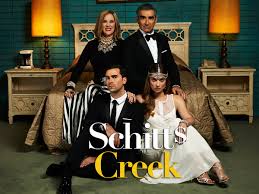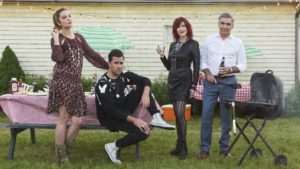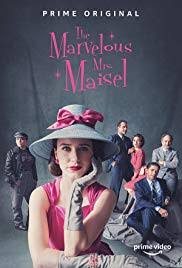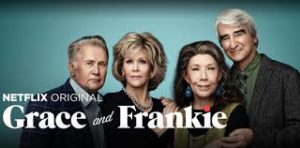Shtisel to Schitt’s Creek, My Top Binge Worthy Shows
My idea of binging used to involve a one-pound box of See’s candies nuts & chews, but nowadays binging usually refers to watching a single show in one sitting for a long span of time. Actually, the analogy between an assorted box of chocolates and my current list of favorite comedies, dramas and reality shows is not such a stretch, considering both indulgences represent a variety of tastes and satisfy my guilty pleasure.
With so many quality shows and genres to choose from on multiple streaming services, from Netflix and PopTV to Amazon Prime and Hulu, this marathon watching trend (addiction) offers many benefits. For some viewers, binging is more than a time suck or an escape from the mundane, such as making dinner, doing laundry, paying bills, and working a job. Good thing I’m a multi-tasker and can fold towels while laughing hysterically at the lovable misfit Rose family portrayed in the cult comedy Schitt’s Creek. I was equally obsessed with Shtisel, a captivating Israeli drama about a Haredi family who lives in the ultra-Orthodox community of Geula in western Jerusalem and invites outsiders into a world we rarely get to experience.
The endearing characters and brilliantly written storylines in both Schitt’s Creek and Shtisel (completely different ends of the spectrum and a tongue twister to say their names in the same sentence), is what appeals to so many binge watchers.  These shows—like real life—are all about relationships and we are enriched by their genuineness that triggers laughter, tears, and all kinds of emotions.Â
I must be onto something because both Schitt’s and Shtisel have devout and rapidly growing fan clubs—each of their Facebook groups exceeds 7,000 members from around the world, and many of these women and men are actively engaged in conversations and share pictures/videos/innermost feelings/memes on a regular basis. How is it possible to have crushes on two completely contradicting male leads from two different shows at the same time?  First, lay eyes on the handsome and stylish Daniel Levy (son of Eugene Levy) who created the Canadian comedy Schitt’s Creek. Daniel plays the irresistibly adorable and quirky David Rose and by doing so has succeeded in bringing pansexuality out of the closet. Then, fall in love with heartthrob Israeli actor Michael Aloni, who plays Akiva searching for his bashert (soul mate) in Shtisel and whose peyot (sidelocks), not to mention mesmerizing green eyes, have us blushing like teenagers. I feel sinful even writing those words about a righteous man, even if he is fictional.Â
The truth is, Schitt’s and Shtisel have made significant impacts on our culture and society by opening the window to a world that until now has been perhaps closed off and misunderstood. And all of these shows on my list, very coincidentally, have a Jewish influence whether directly in their themes or more subtly in their dialogues and personalities which somehow appeal to the masses.Â
Since there’s only so many hours in a day—and and I still have to walk the dog—I try to use my time wisely. For example, even though I admit getting caught up in the gothic horror The Haunting of Hill House last October when I had the flu, I plan to skip season two this Halloween because the terrifying ghosts kept me up all night. But I can’t give up Emmy-winning reality show Queer Eye because “The Fab 5†are really making a difference in people’s lives, plus this makeover team makes me cry every time, and season three premiers this month.
I realize everyone has different tastes—some like peanut brittle, others like toffee. Some like crime thrillers, others like action adventures. This list represents what I crave these days, so grab some dark chocolate almond clusters and a Scotchmallow, and get ready to binge…
SHTISEL (Netflix)
Shtisel is in a class by itself, the title being the last name of the fictional Haredi family we get to know and care about so deeply that it’s hard to let them go after only 24 episodes. Referred to as an “empathetic Haredi soap opera†by a reviewer, Shtisel (not a typo) started out as a popular Israeli television series in 2013-2014 and has become quite a phenomenon around the world since it hit Netflix in December. The show, created by two screenwriters Ori Elon and Yehonatan Indursky who come from Haredi roots, gives us a humane glimpse into a reclusive world which appeals to a wide audience — from secular Jews to the very ultra-Orthodox community portrayed in the show. Even though most of us live vastly different lifestyles than the Shtisels, we still can relate to this middle-class family because many of their everyday problems are like our struggles and many of their nachas (pride and joys) are like ours, especially when it comes to family, love, grief, forgiveness, and, of course a hunger for schnitzel (breaded, fried chicken filets).Â
The patriarch of the large family is Shulem, a 63-year-old widower and Rabbi at a local Yeshiva. Throughout the series, Shulem is constantly smoking cigarettes and eating buttered bread, often at the same time, and he still manages to attract several dynamic Haredi women who want to marry him. All the while, Shulem struggles to marry off his youngest son Akiva. Akiva, nicknamed “Kive,†would rather pursue his own dream as a gifted portrait artist than follow in his father’s footsteps as a religious scholar. The father and son butt heads in a playful and sometimes emotionally painful way, even though they clearly love each other. Shulem burdens his son with unfair expectations, even the matchmaker in town labels Akiva a “screw up†because he falls for untraditional girls. Turns out Akiva may end up marrying his first cousin Libi, the lovely daughter of Shulem’s brother Nukhem, and this marital arrangement is not unheard of in the Haredi community.Â
Of course, we will never know if Akiva and Libi end up together, even though they definitely have chemistry and share the same Jewish values.  The cliffhanger season ends with the couple about to confess their love for each other while sitting side by side on a bench in an Israeli art museum where Akiva’s paintings are on display.Â
Shulem also has a daughter, Giti, who holds down the fort with an apartment full of five children while her husband gets on a bus and disappears to Argentina because we’re not really sure why, maybe soul searching or a mid-life crisis. Unlike the preconceived notions of Haredi women being suppressed and without the same freedoms as their male counterparts, Giti is not broken in her hardships. She is a strong, independent woman who is trapped by her circumstances but she still makes her own decisions, such as the time she agonized about getting an abortion because they had no money. As a working mom who feels betrayed and yet feels her marriage is worth saving, Giti manages to own and operate two start-up businesses (a restaurant which serves homemade Jewish comfort food and a money conversion exchange, which she runs out of her apartment). Their 15-year-old daughter Ruchama, a mini mom who was forced to grow up fast while her father was absent, is enchanted by a young Yeshiva student Hanina and against her parent’s wishes hurriedly marries him.  The scene when Giti is about to enforce Ruchama’s divorce in the courthouse, and then suddenly has a change of heart when she realizes Hanina is the same hungry stranger she met the other day and comforted and fed him in her restaurant, gave me goosebumps and showcases another powerful moment in this show. And Shulem has another son Zvi Arie, who has a wife and children and tsuris (troubles) of his own but tries to keep peace with everyone. A talented singer, Zvi studies Torah fulltime and lets go of his dream to be a rock star wedding singer. Among the many colorful characters that come along, such as the feisty Menukha Kenigsberg who schemes to marry Shulem and replace the memory of his deceased wife, is Bubbe Malka, the 89-year-old matriarch in the family. The loveable grandmother lives in an assisted living facility and is addicted to watching soap operas on her television —a shanda (shame) among the Orthodox but nobody denies bubbe what she wants. The scenes where Malka exchanges Yiddish banter with fellow yenta resident Rebbetzin Erblich are reminiscent of an era gone by. Malka may act mushuggina (crazy), but she has her wits about her when she plans her own “surprise†90th birthday party and grants her own dying wish by visiting the Mediterranean Sea.Â
Shtisel has sparked an interest in learning more about the halachic (Jewish law) rituals and practices of the Orthodox world, and that is a miracle in itself in a time where there is much intolerance even within our own Jewish community. In fact, fans have organized special events in their synagogues where they can ask the Rabbis questions about anything, such as why spouses sleep in separate beds and why women cover their hair, which are depicted in Shtisel. This safe, open dialogue promotes understanding and acceptance among Jews and non-Jews alike.Â
Obviously, Shtisel has left an impact on me, and as I get ready to visit my son who lives in Jerusalem, I’m wondering if I can find a Shtisel tour in Mea She’arim, the oldest Jewish neighborhood in Israel where the show was filmed. After watching Shtisel, I find myself greeting my Jewish friends with a double Shalom, Shalom and acknowledge Baruch Hashem when asked how I am. I’m also more aware to touch the mezuzzah on the doorpost and kiss my hand upon entering and leaving a Jewish home. And oh yeah, I make more potato kugel and cabbage borsht and drink hot tea all day long. The English subtitles are appreciated so that I can enjoy the Yiddish humor of Nachum when he curses Akiva, “May you swallow an umbrella that will open in your gut. Amen!â€Â
Doubt if there will be a season three of Shtisel, although producer Marta Kauffman (Friends, Grace and Frankie) is said to be developing a U.S. version of the show, which won’t be the same.  Meanwhile, if you want to see more of Michael Aloni, (as in shirtless) check out his impressive acting in radically different roles in When Heroes Fly (2018 Netflix) and Out in the Dark. (2012 Amazon Prime).
And I leave you with Shtisel’s beautiful opening theme song.Â
SRUGIM (Amazon Prime)Â
For those going through Shtisel withdrawal, yes that’s a real thing, Srugim is the recommended follow up Israeli drama to binge on while nibbling on chocolate caramels. The title Srugim comes from the Hebrew word that means “knitted” or “crocheted” and refers to the crocheted skullcaps worn by observant Jewish men. This Israeli television drama is described as the religious version of Friends, a 30s-something group of good-looking, intelligent singles who search for their Jewish identity and their better half in the Orthodox world.
After only a few episodes, I feel part of this tight-knit foursome and look forward to their gatherings around the Shabbos table every Friday night. The main characters bring their distinct personalities and tangled love lives to the table and include Yifat, a graphic designer and mother hen of the group; her roommate, Hodayah, a Hebrew University Bible student who breaks away from the restrictions of her religious upbringing and struggles to fit into the secular dating world (she even gets a black bird tattooed on her right shoulder);  Nati, a cocky surgeon and serial dater with commitment issues; Amir, a recently divorced Hebrew instructor who ends up marrying Yifat; and Reut, a high-powered business woman who wears the pants, literally, and drives a motorcycle to work and talks an admiring male tutor into teaching her the haftarah.
No matter how far they stray in their own private worlds of self-discovery, this group of friends comes together to break bread, drink wine, sing songs, and strengthen their unshakable bond. Half way into the show, I noticed Hodayah’s boyfriend Dr. Avri (an anthropologist, not a medical doctor) looked familiar, only with less facial hair and without the long black coat and hat. Turns out, this is same Israeli actor Zohar Shtrauss who played Lipa Weiss, Giti’s husband in Shtisel. Well, you would have thought I found a long-lost friend.Â
Â
It took me about three weeks (we had a long winter) to finish the 45 episodes of Srugim, which originally aired on Yes TV between 2008 and 2012. Unlike many American dramas that use sex to boost ratings, Srugim is different. It’s hugely popular and very romantic and yet no one gets naked or knocked up unmarried. In the Orthodox world, there is no touching between a man and a woman until the wedding night and so these courtships are based on something much more. They date with a purpose, to find and marry their lifelong partner who they will build a Jewish home and continue their heritage. Their paths to matrimony are messy like ours, and that’s what makes Srugim such a delightful binge. Â
Enjoy the Srugim theme song, by ErezLev. Â
SCHITT’S CREEK (Netflix/PopTV):
Now in its fifth season, Schitt’s Creek is the tale of a wealthy family who is forced to move out of their mansion and give up their extravagant lifestyle after losing all their money. They must rebuild their lives in the only asset they have left, a small hillbilly town called, Schitt’s Creek, which they once purchased as a joke. Schitt’s Creek is the name of a real place in the small Canadian town of Goodwood (population 600), in Ontario. The entire cast is Canadian, by the way. The patriarch of the Rose family is Johnny Rose, played by Eugene Levy (Second City Television) and the Jewish guy with the trademark thick salt-and-pepper hair and bushy eyebrows. His wife Moira is played by the incomparable Catherine O’Hara (also from Second City fame), so you can imagine the comedy magic that ensues.
.
The Roses live with their two adult children, David and Alexis, in two adjacent rooms in a rundown motel in Schitt’s Creek.  The creative genius behind Schitt’s Creek is Daniel Levy, who plays David (“Ewww Davidâ€), and he is the show’s creator and head writer. His sister in the show is played by Annie Murphy, whose catchy original song “A Little Bit of Alexis†is climbing the charts to everyone’s amazement. Dan’s real-life sister Sarah Levy plays Twyla Sands, the friendliest waitress at The Café Tropical, so it’s a family affair. Accolades go to the rest of the talented ensemble, including Chris Elliott (Roland Schitt), Emily Hampshire (Stevie Budd), Jennifer Robertson (Jocelyn Schitt), Dustin Milligan (Ted Mullins), Karen Robinson (Ronnie Lee), and let’s not forget Noah Reid, who plays David’s cutie pie boyfriend Patrick Brewer and whose serenade to Tina Turner’s “Simply The Best†has gone viral. That is the power of Schitt’s Creek fans and social media.Â
Schitt’s Creek has won a slew of Canadian awards, and the fanatical fans, who call themselves “Schittheads,†take this comedy series very seriously, selling out auditoriums across the country that feature meet and greets with the cast.Â
Eugene Levy was born and raised in a Jewish family in Hamilton, Ontario, and he and his wife Deborah chose to raise their kids away from Hollywood with both religions. Their real interfaith family is the inspiration for the Jewish humor sprinkled throughout the series.Â
We first learn that the Rose family has Jewish genes at their annual Christmas Eve party in episode four when Johnny declares, “That reminds me! Somebody needs to find the menorah!† Then adds, “I was worried this menorah was so close to the garland. The last thing we want is the motel to burn down…†to which Moira whispers something sinister under her breath.Â
Another Jewish reference happens in season five, episode nine, when David mentions he used to play on a baseball team in Hebrew school named the Flying Latkes. His father brags, “He had a pretty strong arm in the outfield, and the Rabbi used to call him Popeye.â€
Being Jewish comes up again at David and Patrick’s shop, Rose Apothecary when  Stevie wishes Patrick “Merry Christmas.†David is insulted because he does not get a holiday greeting.Â
David says, “I’m a delightful half-half situation, which is why it’s so annoying my dad thinks he can boss people around on a holiday that he technically has no authority over.â€
And in the most recent episode called “Roadkill” Johnny accidentally drives his car over a neighbor’s cat, while Moira justifies the tragedy as “It’s the circle of life…you just provided a Passover seder for a family of hawks.”
And the show just keeps getting better and better. If anything else, tune into see Moria’s wacky wardrobe which includes feathers, ruffles, chunky statement jewelry, platform shoes, lots of zigzags and stripes, and a wall full of wigs that tell a story in themselves.Â
Listen to the ending theme song of Schitt’s Creek by Canadian film and TV composer and songwriter Maribeth Solomon.
MARVELOUS MRS. MAISEL (Amazon Prime)
I fell in love with Marvelous Mrs. Maisel from the get go—set in the late 1950s when women in coiffed hairdos dressed fancy in heels, jewelry, long gloves, and that was on a casual day to run errands. The show centers around Jewish working mom Miriam “Midge” Maisel who has the perfect life, a doting handsome husband (Michael Zegen), two kids, a luxury apartment on New York’s Upper West Side, and adoring parents Rose and Abe Weissman (Marin Hinkle and Tony Shalhoub) who spend their summers in the Catskills.Â
Midge, played by newcomer Rachel Brosnahan (not Jewish in real life) is more than a housewife and mother (we actually don’t see her with the kids too often, which irritates some viewers because they question her unrealistic parenting skills. Whatever.). Where Midge really shines is on stage, as a stand-up comedian playing the cafes and nightclubs of Greenwich Village, which is an oddity for a woman, especially in that era.  All the while, Midge is trying to further her husband Joel’s standup career, but turns out she is the funny and smart one. Midge writes her own stuff based on her domestic life and has what it takes to be a success—chutzpah.  Her loudmouth agent Susie Myerson (Alex Borstein), who frequently drops F-bombs, is the perfect sidekick and reminds Midge “tits up†like a mantra before her client goes on stage.
When Midge’s husband leaves her for another woman, standup becomes more than a hobby but a livelihood, good thing she lives with her wealthy parents and the fridge is always full. Her day job is answering phone calls at the switchboard in the basement of the swanky B. Altman department store in Manhattan after she was demoted from the makeup counter, which is her calling besides standup.Â
With two seasons under its corset, Marvelous Mrs. Maisel is a smash hit, winning 13 awards since its premiere in 2017, including eight Emmys, individual wins for Brosnahan and Borstein as well as the award for best comedy series; Shalhoub was nominated for best supporting actor in a comedy. Shalhoub and Brosnahan also won individual Screen Actors Guild (SAG) Awards in January, and the cast took home an ensemble award. With all this success, a third season will be announced as soon as the stars finalize their contract negotiations.
Maisel doesn’t have a theme song, but the show’s soundtrack is filled with classics about women who get shit done, like Barbara Streisand’s Just Leave Everything To Me.
KOMINSKY METHOD (Netflix)Â
Kominsky Method, starring Jewish actors Alan Arkin and Michael Douglas, is one of the only shows my husband has binged on without falling asleep. Well, that and Ozarks, a dark American crime drama in which Justin Bateman won a SAG Award for Outstanding Performance by a Male Actor in a Drama Series. Â
The premise of the Kominsky Method by Chuck Lorre (Two and a Half Men and The Big Bang Theory) works better on screen than it does on paper. It’s a story about two aging, kvetchy Jewish men in Los Angeles. And yet, we’re hooked on the chemistry between these two comedy legends. Now that I’m in my mid 50s, I appreciate shows that embrace aging by giving these characters new love interests, hobbies, careers, and adventures despite all their aches and pains. They talk about relevant topics, such as death, loneliness and their sex life with a changing libido, and somehow it’s funny.Â
Arkin, 84, plays Norman Newlander, a talent agent whose wife passes away in the first episode. Douglas, 74, plays Sandy Kominsky, a failed actor who teaches his “method†to a new generation of college students, whose generation looks at life, politics, and sex a lot differently than their coach.Â
The daughters in the show, Sarah Baker as Mindy Kominsky, and Lisa Edelstein as Phoebe Newlander, add a fresh twist to the plot. Mindy is a loving, doting daughter to Sandy, while estranged daughter Phoebe is a recovering addict and pain in the neck to Norman.Â
With three Golden Globe nominations right out of the gate, Kominsky Method targets a new demographic, an older audience who is hungry for more shows like this. The show manages to find humor in aging, grief, male friendship, and yes, an enlarged prostate. In Chapter 3, Sandy goes to his physician for a prostrate check, which doesn’t seem funny, except that Dr. Wexler is played by his old pal Danny DeVito and the scene, albeit uncomfortable, will have you in stitches, no pun intended.Â
So if you’re looking for a show that isn’t afraid to tackle the twilight years, Kominsky Method might be a great excuse to snuggle on the couch with your husband while munching on chocolate cherry truffles. Season two, with eight episodes, is currently in the works. Â
GRACE AND FRANKIE (Netflix)
Here’s another comedy series that targets older viewers, only the plot of Grace and Frankie centers around female friendship instead of male bonding. The phenomenal cast, starring powerhouse duo Jane Fonda and Lily Tomlin, is to die for, again, no pun intended. This Emmy and Golden Globe-winning series has been renewed for a sixth season, but we’ll have to wait until next January.
In the show’s pilot, Grace and Frankie, played by real-life friends Fonda and Tomlin, learn that their husbands, Robert Hanson (Martin Sheen) and Sol Bergstein (Sam Waterson), are not just work partners in a law firm but lovers in a secretive relationship for 20 years. The ladies are devastated to say the least, but over time they learn to accept their new life (and new romances), and most importantly, newfound kinship between the two of them. Grace and Frankie live together in an impeccably decorated beach house (their kids try to move them into a retirement home that doesn’t last long) and these two could not be more opposite in personality. Grace is conservative, meticulous, and business-like with perfect hair and makeup, while Frankie is a Jewish hippy loving, free spirited creative soul with attention deficit disorder. Together, they grow to love each other in a soul mate, bashert, kind of way and teach us what female friendship is all about.Â
Grace and Frankie are not ready to retire or give up on their love lives, in fact, a new chapter is just beginning. They start a new vibrator business, called Ménage à Moi, which gives way for plenty of  hysterical scenes. Their blended families are the new normal, too, as they forgive their exes and everyone accepts their new way of life.  Grace has two daughters, Brianna (June Diane Raphael) and Mallory (Brooklyn Decker), and Frankie has two adopted sons Coyote (Ethan Embry) and “Bud†(Baron Vaughn), and they often join forces to keep their moms in line to no avail.
So, what are you binging on? I’m gonna need more chocolate.Â






